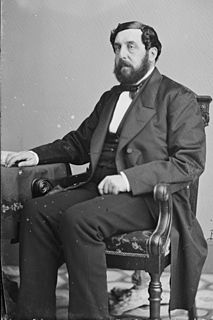A Quote by Benjamin Disraeli
Fame and power are the objects of all men. Even their partial fruition is gained by very few; and that, too, at the expense of social pleasure, health, conscience, life.
Related Quotes
The power to determine the quantity of money... is too important, too pervasive, to be exercised by a few people, however public-spirited, if there is any feasible alternative. There is no need for such arbitrary power... Any system which gives so much power and so much discretion to a few men, [so] that mistakes - excusable or not - can have such far reaching effects, is a bad system. It is a bad system to believers in freedom just because it gives a few men such power without any effective check by the body politic - this is the key political argument against an independent central bank.
At the outset do not be worried about this big question-Truth. It is a very simple matter if each one of you starts with the desire to get as much as possible. No human being is constituted to know the truth, the whole truth, and nothing but the truth; and even the best of men must be content with fragments, with partial glimpses, never the full fruition. In this unsatisfied quest the attitude of mind, the desire, the thirst-a thirst that from the soul must arise!-the fervent longing, are the be-all and the end-all.
PLEASURE and pain are undoubtedly the ultimate objects of the calculus of economics. To satisfy our wants to the utmost with the least effort - to procure the greatest amount of what is desirable at the expense of the least that is undesirable - in other words, to maximize pleasure, is the problem of economics.
The use of knowledge in our sex (beside the amusement of solitude) is to moderate the passions and learn to be contented with a small expense, which are the certain effects of a studious life and, it may be, preferable even to that fame which men have engrossed to themselves and will not suffer us to share.
Our modern world-view tragically misperceives and wrongly defines what it is to be human. We are conditioned by our society to believe happiness comes from pleasure, or from getting things or power over people or money or fame or even health and survival. None of these sometimes very good things can bring ultimate meaning to our lives. We are born to be deeply conscious, inwardly free and deeply capable of love. The longing for these things is the definition of what it means to be human.
Just as women supplement men in private life, so they will supplement men in public life by concentrating their organized efforts on those objects which men are likely to ignore. There is a tremendous field for women as active protagonists of new ideas and new methods of political and social housekeeping. When organized and conscious of their power to influence their surroundings, women can use their newly acquired freedom in a great many ways to mold the world into a better place to live in.
Criticism is a study by which men grow important and formidable at very small expense. The power of invention has been conferred by nature upon few, and the labour of learning those sciences which may, by mere labour, be obtained, is too great to be willingly endured; but every man can exert some judgment as he has upon the works of others; and he whom nature has made weak, and idleness keeps ignorant, may yet support his vanity by the name of critic.
The villager, born humbly and bred hard,
Content his wealth, and poverty his guard,
In action simply just, in conscience clear,
By guilt untainted, undisturb'd by fear,
His means but scanty, and his wants but few,
Labor his business, and his pleasure too,
Enjoys more comforts in a single hour
Than ages give the wretch condemn'd to power.
Any consideration of the life and larger social existence of the modern corporate man begins and also largely ends with the effect of one all-embracing force. That is organization - the highly structured assemblage of men, and now some women, of which he is a part. It is to this, at the expense of family, friends, sex, recreation and sometimes health and effective control of alcoholic intake, that he is expected to devote his energies.

































